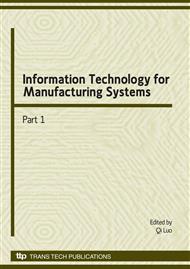[1]
O. Goldreich, S. Micali and A. Wigderson. How to play any mental game or a completeness theorem for protocols with honest majority, Proc. ACM STOC '87, 1987: 218-229.
DOI: 10.1145/3335741.3335755
Google Scholar
[2]
A. Yao. Protocols for Secure Computation, Proc. IEEE FOCS '82, 1982: 160-164.
Google Scholar
[3]
M. Ben-Or, S. Goldwasser, A. Wigderson. Completeness theorems for non-cryptographic fault-tolerant distributed computation, Proc. ACM STOC '88, 1988: 1-10.
DOI: 10.1145/62212.62213
Google Scholar
[4]
D. Chaum, C. Crepeau, I. Damgard. Multi-party unconditionally secure protocols, Proc. ACM STOC '88, 1988: 11-19.
DOI: 10.1145/62212.62214
Google Scholar
[5]
J. Bar-Ilan, D. Beaver. Non-cryptographic fault-tolerant computing in constant number of rounds of interaction, Proc. ACM PODC '89, 1989: 201-209.
DOI: 10.1145/72981.72995
Google Scholar
[6]
K. Nissim, E. Weinreb. Communication efficient secure linear algebra. In: Halevi, S., Rabin, T. (eds. ) TCC 2006. LNCS, vol 3876. Springer, Heidelberg, 2006: 232-246.
Google Scholar
[7]
R. Cramer, I. Damgard. Secure distributed linear algebra in a constant number of rounds. In: J. Kilian, (ed. ) CRYPTO 2001. LNCS, vol 2139, Springer, Heidelberg , 2001: 119-136.
DOI: 10.1007/3-540-44647-8_7
Google Scholar
[8]
R. Cramer, E. Kiltz1, and C. Padro. A Note on Secure Computation of the Moore-Penrose Pseudo-inverse and Its Application to Secure Linear Algebra. In: A. Menezes. (ed. ) CRYPTO 2007. LNCS, vol 4622, Springer, Heidelberg, 2007: 613-630.
DOI: 10.1007/978-3-540-74143-5_34
Google Scholar
[9]
Y Ishai, E Kushilevitz. Private Simultaneous Messages Protocols with Applications, Proc. 5th Israel Symposium on Theoretical Comp. Sc. (ISTCS '97), 1997: 174-183.
Google Scholar
[10]
Y. Ishai, E. Kushilevitz. Randomizing Polynomials: A New Paradigm for Round-Efficient Secure Computation, Proc. of FOCS '00, (2000).
DOI: 10.1109/sfcs.2000.892118
Google Scholar
[11]
K. Mulmuley. A Fast Parallel Algorithm to Compute the Rank of a Matrix over an Arbitrary Field, Combinatorica, vol 7, 1987: 110-114.
DOI: 10.1007/bf02579205
Google Scholar
[12]
E. Kiltz, P. Mohassel, E. Weinreb, et al. Secure Linear Algebra Using Linearly Recurrent Sequences, TCC 2007, LNCS 4392, 2007: 291-310.
DOI: 10.1007/978-3-540-70936-7_16
Google Scholar
[13]
M. Ben-Or, S. Goldwasser and A. Wigderson. Completeness theorems for non-cryptographic fault-tolerant distributed computation (extended abstract). 20th STOC, (1988).
DOI: 10.1145/62212.62213
Google Scholar
[14]
I. Damgard, M. Fitzi, E. Kiltz, et al. Unconditionally secure constant-rounds multi-party computation for equality, comparison, bits and exponentiation, Proc. 3rd Theory of Cryptography Conference, LNCS 3876, Springer, Heidelberg, 2006: 285-304.
DOI: 10.1007/11681878_15
Google Scholar
[15]
I. Damgard, J. Nielsen. Scalable and Unconditionally Secure multiparty computation. In: Menezes, A. (ed. ) CRYPTO 2007. LNCS, vol. 4622, Springer, Heidelberg , (2007).
Google Scholar
[16]
M. Hirt, J. Nielsen. Robust multiparty computation with linear communication complexity. In: Dwork, C. (ed. ) CRYPTO 2006. LNCS, vol. 4117, Springer, Heidelberg , 2006, 463-482.
DOI: 10.1007/11818175_28
Google Scholar
[17]
B. Zuzana, M. Hirt. Perfectly-Secure MPC with Linear Communication Complexity: In R. Canetti (ed. ): TCC 2008, LNCS 4948, Springer, Heidelberg 2008. 213-230.
Google Scholar


